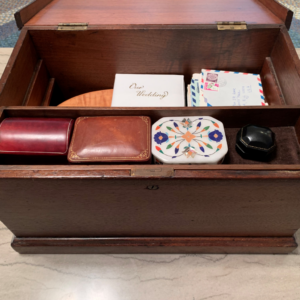The Legacy Box
The Legacy Box
By Robin Bush, ISR Communications
Recently, Clara received a package from her brother. In it were autobiographies her parents had written, along with papers, letters, and newspaper clippings that provided a look into the lives of her ancestors. She had old photos of them, but they’d always just been faces on paper; never were their stories attached to help her understand their lives.
Each day for a week, she opened the box, slowly unwrapping the layers in this unexpected gift. There was her grandfather’s story of a driving trip he’d made in 1963 from New York to California and his discovery of an America so different from the one she knows. There were heart-stopping letters home from her father during WWII France in 1943 and one about a trip to England (a long way to go for a working-class boy). He had never been beyond New York, let alone to France or England in wartime. He sounded upbeat about the adventure, but his carefully chosen words offered insights into the realities of a young sergeant’s wartime life.
There was a biography of her aunt and uncle that told of their struggles and prosperity from 1943 – 1993 and a series of newspaper clippings detailing the story of the hatchet murder of her great-great-great-great grandfather. That lore had never made it down through the generations! She found fragile newspaper clippings from 1928 detailing the employment of her ancestors (men and women) who ran the county post office from 1871 to 1904. It drew a line of connection between them and her grandfather, who’d worked the postal train in the ’30s. There were three generations of marriage certificates, her parent’s school diplomas, a salutatory speech her mom gave in high school, and even her grandfather’s 1915 teacher’s certificate.
This collection told her more of her family history than her parents or grandparents had ever shared while they were alive. She wondered what other lessons they would share about what is in the box if they could. She wanted to know what gave those moments meaning and which shaped the direction of their lives. Gathering their wisdom from across the ages and preserving connections across generations helps her answer the eternal questions we all wonder about: where did I come from; who am I?
When we decide to write our stories, they are the footprints we leave behind for those who survive us. We don’t need to write the great American novel. Instead, we gather a collection of memories, a timeline, or footnotes on photos that become our DNA. It’s our opportunity to record who we are and reflect on what we value and what we did to lead a purposeful life. It is a gift to share both where we succeeded and where we failed. Stories keep us alive for generations yet to come. Our stories are the harvest of our wisdom, love, hopes, and dreams for those yet to be born.
Think about a few things you have that you could put into a legacy box. Someday, Clara’s daughter will unwrap both legacy boxes and uncover family history. Perhaps she’ll find Clara put something in the box years before that will be a clue to a choice she’d made or a lesson she’d learned that will help her daughter live her best life. The legacy box is the harvest that connects us across time, and it is bountiful.
“Harvesting a life means remembering, cherishing, and telling the stories of one’s lifetime. Harvesting means accepting the role of elder…to gather your lifetime like a ripened crop and to offer the best of what you’d learned to the future.” – Bert Keller, Bioethicist
References:
Originally published in the ISR Journal, Fall/Winter 2021

